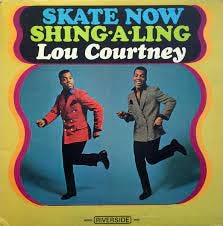On Shing-a-Ling and Stewardship
Two news stories capture divergent -- some would say surreal -- notions of value around music
ITEM: What’s the Value of 3 Million LPs in a Digital World? by Marah Eakin, Wired Magazine, posted January 7, 2024.
ITEM: Their Songs Were Stolen by Phantom Artists. They Couldn’t Get Them Back by David Segal, The New York Times, posted January 13, 2024.
The cover image jumped out from the landing page of the Archive of Contemporary Music: A suave soul singer from Buffalo named Lou Courtney, working a dance craze angle with the 1967 record, Skate Now Shing-A-Ling.
Sounded like my kind of diversion.
Unfortunately there are crickets in streaming land where the Lou Courtney records should be. Eventually I tracked down the singles on YouTube, and also a record Courtney made later – the wondrous and orchestral I’m In Need of Love, which came out on Epic in 1974.
This one has some sparkle: Courtney’s originals are gritty and sophisticated at the same time, with adventurous melodies and chord sequences that slide beyond conventional vamps. The playing is crisp – some credit for that goes L. Leon Pendarvis, the keyboardist who’s been a fixture of the Saturday Night Live band for decades, and who, in 1974, was also involved in Bonnie Raitt’s Streetlights. And the production, from Courtney and Jerry Ragovoy, places the rhythm section nicely forward. Sweetening touches of vibes, strings and horns are used judiciously, to enhance (and not overpower) the songs.
Courtney’s Epic run ended after I’m In Need of Love failed to connect; the album came to the attention of the U.K.’s Northern Soul obsessives after Eddie Kendricks covered two of its songs for his 1981 Love Keys album.
Courtney returned in 1976 with a slightly funkier take on New York soul, Lou Courtney/Buffalo Smoke for RCA. Again the personnel list was top shelf, and some of the songs were great; again the work failed to attract an audience. Courtney briefly joined the Fifth Dimension in 1978, and performed his own material sporadically after that. He died in 2021.
I should have expected precisely such a detour when I visited the ARCchive of Contemporary Music home page, because the archive itself is home to delights and curiosities across a jaw-dropping range of musical endeavor. I was there to learn about efforts to save and digitize and rehome its massive holdings, which include over 3 million vinyl records, among them some 18,000 blues records owned by Keith Richards of the Rolling Stones and other similar artist collections. The collection goes beyond classic and obscure works issued by U.S. labels (large and small) to include massive collections from private citizens – one music obsessive, a businessman named Zero Freitas, donated what’s believed to be the largest collection of Brazilian music outside of Brazil.
The headline of the recent Wired story about the nonprofit ARC asks “What’s the Value of 3 million LPs in a Digital World?” It’s a good question: To the average streaming-music consumer, the fastidious storage of physical artifacts might seem like an oldtimer’s folly – after all, aren’t the streaming services taking care of recorded artifacts by digitizing them? Aren’t the labels themselves maintaining archives?
No and no.
As endlessly harped upon here at EL and across the Internet, the streaming services are just data-warehousing businesses. Though they make money as “brokers” of music culture and offer playlists that suggest a certain passion for it, they’ve all taken the position that anything beyond the sounds – like information about who played on a record, where it fits in an artist’s discography and other contextual bits that are essential to music discovery – is beyond their purview. Result: Patchy, scattershot information that’s wildly inconsistent from one title to the next – and, crucially, doesn’t spark sustained curiosity or help that amazing pedal steel player from Nashville get the next gig.
So the real work of music stewardship – not just for current fans but for future generations – falls to places like the ARC and individuals who believe that the physical artifacts have a role in the culture. Who believe in underknowns like Lou Courtney and understand the catnip-like pull that Shing-A-Ling cover image might someday have on a music obsessive.
The ARC started in the mid ‘80s; it’s currently run by B. George, one of two founders, and is in danger of becoming homeless. Three years ago George moved the entire collection out of lower Manhattan to a donated commercial space in upstate New York, only to learn that the space is zoned for agricultural use. The ARC has to move again. That’s no small task, and so the organization – which is not currently open to the public but is available to those doing research – has embarked on a media campaign to raise money and awareness.
The current run of press focuses on the massive holdings and the celebrities on the advisory board. It doesn’t address the issues of preservation, or the costs of doing preservation on this scale. But a story in the Guardian picked up on one of the guiding ideas of its work: The ARC avoids all curation bias, resisting music-snob judgement about whatever titles come in the door. As George told the Guardian: “We have no interest in quality….It started that way from the very beginning because there’s no way to tell what’s valuable in the future. Everybody brings their own criteria and tastes to things in their own time. But the future is quite different, as we hope.”
Let’s take a step back and think about this vision in the context of the other story above, from this Sunday’s New York Times. The ARC is locked in an existential struggle partly because it values music (all music!) in its physical form and is doing everything possible to save and catalog it. Meanwhile over in the digital music realms, smalltime local artists – who have recorded original work and are simply trying to share what they do – have had their music brazenly ripped off. The maldoers are crafty pirates who slap a different artist name and different metadata onto the audio files. Then the thieves use commonly-known traffic-boosting (and playlist-juicing) tricks to gin up more spins. Then they sit back and wait for the big payouts, from Spotify and other streaming services. (OK, kidding about the high-dollar part….).
And, big surprise! the streaming services apparently don’t care.
That’s right, we are living in an age when talentless data jockeys can swipe audio files, change the names of the artists and the tracks, and install themselves as rights holders. These people (bots?) are rarely caught, because the original creators of the work don’t always know that this theft has even happened. The Times story suggests that it’s an uphill battle to get the streaming services to even pay attention to this fraud. Much less go after it.
That might be because those services have been expending so much effort tweaking the payment algorithms – see Spotify’s recent announcement that starting in early 2024, it will eliminate payments for songs with less than 1,000 annual streams. These artists are not even flyspeck rounding errors – more like bookkeeping nuisances.
Or it might be because they’ve been so diligent about policing rampant search-term abuse. (Dare you to ask Spotify for “Jazz Piano” and see what comes back; it’s usually not Art Tatum or Bill Evans or a name brand player, instead an unknown whose talent is in search manipulation. To really see the absurd extremes of this, add the word “Relaxing” to any search.).
Or it could simply be that these services don’t understand the concept of stewardship. Music is not an infinitely exploitable short-term commodity or endlessly renewable resource. It is an artform that takes time to master and cultivate. The creatives working in this form depend on the goodwill of humans acting cooperatively within a complex ecosystem that includes enthusiasts and collectors, radio stars and (yes) distributors. This system runs on kinetic energy and love; while it is bought and sold in the realm of commerce, music is first and fundamentally driven by emotion. The people behind ARC understand this. They recognize the vitality of this circuit and sense how precarious its future is in the ever-more-fractured digital age.
The people at Spotify are on the front lines – they could save ARC in a minute, not that this would necessarily be a welcome development. Spotify’s position atop the streaming world confers plenty of benefit – yet somehow, this company has completely sidestepped the responsibility that goes along with that. It’s reasonable for the public to expect the leaders in this segment to be guardians and champions and advocates of the art that is central to the entire operation. Yet at every chance, the C suite leaders have shirked those roles. They don’t even bother with the usual corporate lipservice. They don’t respect the craft.










Amen
A bang on piece!